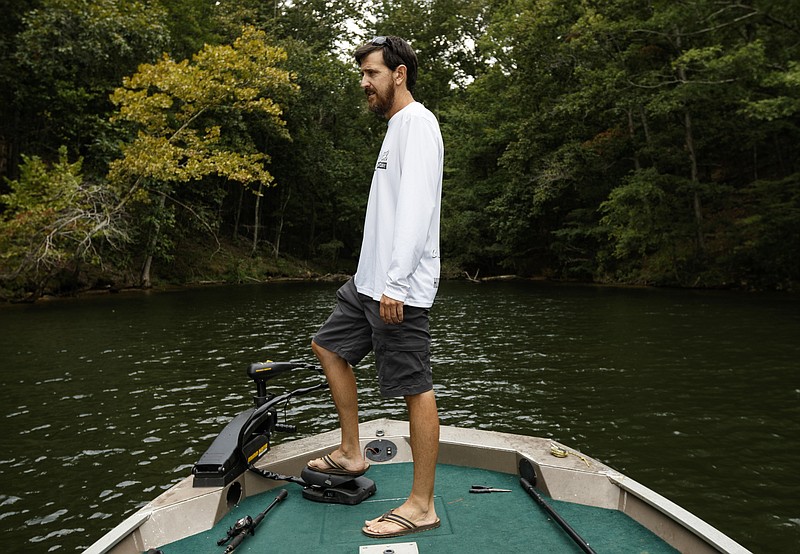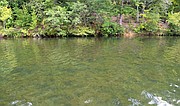Through a small tunnel, tucked in an area with no homes and no docks, a tributary off Soddy Creek slowly flows with clear water. It's filled with aquatic plant life. Plants measure more than 10 feet tall and nothing but a thriving ecosystem lines the shore.
At nearby Possum Creek in Soddy- Daisy, it's the same story.
The view from the side of a boat is nothing but fresh water full of fish and weeds - a fisherman's paradise.
"This is what it's supposed to look like," local fisherman and clean water advocate Chris Sumrell said.
A short boat trip to Soddy Creek paints a different picture.
Plant life is scarce. Weeds, which act as a filtration system for the water and provide cover for fish, are less than a foot high in the few places they can be found.
The creek is dark. The naked eye can't see more than a few inches through the murky water.
Trips to other creeks in the area paint a similar picture.
Sumrell looked at his boat's sonar, remembering the thriving vegetation and clear water once there.
"This is when I realized something was wrong."
***
Experts say weeds and other plant life are disappearing from many of the Tennessee Valley's creeks.
It's a welcome sight for recreational water users and people with docks lining the shores. For fishermen, it's a nightmare, but the topic is divisive even among them.
The water weeds provide fishing hotbeds as the plants act as shelter for aquatic life. Fishermen search around the region for the best places with aquatic plants. Many agree they are disappearing, but they don't all agree on why.
In several posts about the topic on the Chattanooga Fishing Forum, dozens of commenters are split on the issue.
Some blame herbicides being dumped in the water. Others blame Mother Nature.
Even among those at the Chattanooga Bass Association, it's controversial.
"It's unacceptable what they're doing," Vice President Brad Ferguson said about those spraying herbicides in the water. "We have world-class fisheries here, and people don't take care of it."
Ferguson doesn't allow his daughter to swim in many of the area's lakes and rivers because of concerns about chemical use.
The association's president finds himself on the other side of the issue. He understands the anger of Ferguson and other fishermen, but despite that understanding, he believes the disappearance is weather-related.
"The fishermen are paranoid, that's who they are," Chattanooga Bass Association President Shane Frazier said. "It's not from any type of spraying that's happening. I think it's weather-related."
***
Sumrell was a boy learning to fish in the late 1980s.
Local creeks, lakes and ponds were full of weeds. Non-native plant species such as hydrilla and milfoil were suffocating local ecosystems. The problem was getting worse. A drought allowed weeds to grow rampant, Tennessee Valley Authority officials said at the time, and they were fighting a losing battle.
While many fisherman loved the weeds, which led to ideal fishing conditions and a more natural environment, others who lived or played on the water complained about the slimy, tangly mess taking over local waters.
Scientists at TVA, which manages much of the valley's water, argued at the time the weeds were dangerous. They also warned against allowing non-native plants to grow and dominate the ecosystem.
TVA started to fight the weeds aggressively and focused on areas by beaches, boat ramps and other public spaces.
The agency dropped herbicides from helicopters and sprayed the water with combinations of chemicals such as Aquathol K, Diquat, 2,4-D and Fluridone, also known as Sonar.
The weeds began to clear after the spraying, but it coincided with a weather change. The drought had ended and rainfall increased. TVA claimed the change in weather caused the weeds to disappear, not its herbicides. Many fishermen didn't believe what they thought was a tale.
Complaints and protests resulted in a public hearing. Fishermen called TVA's methods "dangerous" and "reckless."
TVA representatives at the time assured the public no long-term damage was being done to the water and all the products it used were approved by the Environmental Protection Agency. The latter statement was unquestionably true, although TVA at first did not have the necessary permit to spray the chemicals, according to Times Free Press archives.
Fishermen continued to warn of the danger, and in April 1993, the Chattanooga Bass Club sued TVA in federal court.
***
In 2015 and 2016, plant growth nearly mirrored that of the late 1980s as weeds grew uncontrollably during a record-setting drought.
Whether weeds grow mostly depends on weather and what's going on in the water during peak growing season, said Brett Harris, also known as TVA's "Dr. Weeds." Harris has a doctorate in aquatic biology and is TVA's expert on all things weed-related.
A drought causes ideal conditions for many aquatic plants. The water's slow rate of flow from the lack of rainfall and increased sunlight when the water level drops can lead to an overwhelming growth in weeds.
"Weeds can go from boom to bust in one year," Harris said. "The past two years were closer to the big boom years of the late '80s that everybody talks about with aquatic plants."
Once the rain starts falling, it's an entirely different story. Water flow increases, washing away many aquatic plants.
This year, he said, weeds "are incredibly - and I want to emphasize that - incredibly slow this year to come on," he said.
***
TVA agreed to stop spraying chemicals for three years as a result of public outcry and the 1993 lawsuit, but by 2017, most of the practices of the late '80s and early '90s are back in use. TVA treats a small portion of the area's waterways with the same EPA-approved chemicals that were the source of complaints 25 years ago.
"We really didn't do anything different [this time]," Harris said. "For the most part, we are using the same techniques."
TVA still treats water around docks and other public-use areas with herbicides and a boat with blades that works similarly to a lawnmower.
In total, TVA treats a tiny fraction of the water in the valley, Harris said. On Chickamauga Lake, for instance, TVA has treated roughly 29 acres this year out of more than 36,000, or about 0.08 percent.
And the treatment only takes a portion of the year.
"We try to manage for that peak use time," Harris said, which is mainly while school is out for summer break.
TVA says the chemicals it uses are safe and are used only on a tiny fraction of area lakes.
The three-month pause on spraying had more to do with optics than concern over the herbicide use.
"To be honest, that was kind of in response to pushback and perception," Harris said. "Everyone thought it was us that [killed the aquatic plants], versus Mother Nature. There was quite a bit of uproar during that time period, whether warranted or not, and it really kind of set the program back for awhile."
This time around, TVA is learning from what it saw as a perception problem.
Some fishermen are pushing back again, demanding answers, and angst is growing. The federal corporation is working to educate the public, Harris said, but he asserts the disappearance of aquatic plants is almost entirely because of weather patterns.
***
And even if herbicides are playing a role, TVA is not the only agency that uses them.
"I'm not even sure it's TVA who is causing this," Sumrell said on a recent calm morning on the water.
Some of the loudest complaints are against dock owners. Dock owners can legally hire licensed companies to spray herbicides within 80 acres of their property, which could explain why so much water in the valley is barren near homes but remains flush with growth in uninhabited areas.
"One of the big things on Chickamauga [Lake] is that private homeowners in the state of Tennessee can contract a licensed applicator to do that type of work," Harris said.
He said some private owners have done Fluridone treatments, "but that's not something [TVA does] because really the key to our program is providing a balanced approach for all the stakeholders. That's why we only manage right around boat ramps, and we don't essentially manage out in the middle of the lake or somewhere like that."
There are unconfirmed reports of neighborhood associations passing out herbicides to lakefront property owners to throw off their docks.
The Tennessee Department of Environment and Conservation doesn't know of any instances of such behavior but warns of its danger.
If anyone did "dump pesticides off their docks," it could harm the environment, TDEC communications director Eric Ward wrote in an email.
"If any activity like that is observed, it should immediately be reported to the Tennessee Department of Agriculture," Ward wrote.
Ward said if residents do spray, they should use licensed applicators who know state regulations and the type of aquatic plants being treated.
***
Biologists maintain the disappearance is weather related, but fishermen are quick to point out the stark difference in plant growth, or lack thereof, near homes.
Clusters of lakefront homeowners could legally cover miles of water with chemicals if they all hired licensed applicators to dump herbicides.
Sumrell turned the boat and headed back to the dock, passing by homes lining the shore. Dead weeds floated by.
"I don't want to see this happen again."
Contact staff writer Mark Pace at mpace@timesfreepress.com or 423-757-6361. Follow him on Twitter @themarkpace and on Facebook at ChattanoogaOutdoors.
Weed control
Aquatic pest control companies licensed in Chattanooga area:› Aqua Services Inc., Guntersville, Ala.› Aquascape Environmental, Woodstock, Ga.› Aquatic Control Inc., Memphis› Aquatic Control Inc., Elizabethtown, Ky.› Aquatic Control Inc., Seymour, Ind.› Aquatic Resource Management, LaFayette, Ga.› Aquatic Weed Wizards, Knoxville› C W Environmental Services Inc., Johnson City, Tenn.› Estate Management Services Inc., Brunswick, Ga.› Herbi-Systems Inc., Bartlett, Tenn.› Jones Fish Hatcheries & Distributors Inc., Buchanan, Tenn.› Lake Weed Controls, Kingston, Tenn.› Landmark Construction Services Inc., Buchanan, Tenn.› Landscape Service Group, Collierville, Tenn.› McCloud’s Pest & Lawn, Hendersonville, Tenn.› Nature’s Gallery, Mount Juliet, Tenn.› O’Brien and Sons, Nolensville, Tenn.› Orkin Exterminating Co. Inc., Murfreesboro› PLM Lake & Land Management Corp. DBA PLM of Tennessee LLC, Milford, Mich.› Progressive Solutions, Bean Station, Tenn.› Quest Enterprise, Rogersville, Tenn.› Small Waters, Lewisburg, Tenn.› Solitude Lake Management, Virginia Beach, Va.› Southeastern Pond Management, Jackson, Tenn.› Stephen B. Gibbs, Philadelphia, Tenn.› Total Property Management Inc., New Market, Tenn.› West Tennessee Pond Management, Jackson, Tenn.

